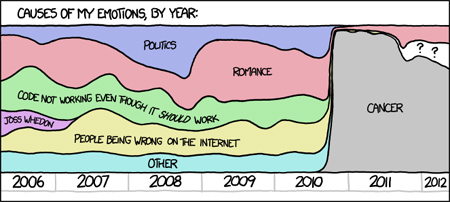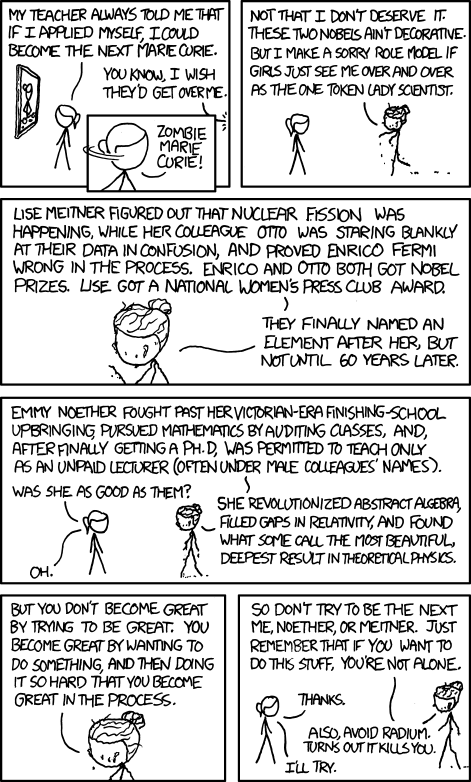
Apr 29, 2013
It’s no secret that I think Randall Munroe often presents things through his XKCD comic that are not only well worth knowing, but that pertain specifically to living a better life. His most recent (as of this writing) is an especially practical example.

Is it worth the time?
A couple of useful things we can do with this chart:
- Consider areas in our lives where it might be worth some time thinking about improvements.
- Consider things we’re doing to make life more efficient that might not be worth the trouble.
Like this:
Like Loading...

Aug 1, 2012
Today’s XKCD cartoon shows that internal commentary I talk about, and (as usual) manages to be really entertaining to boot (at least, to me, having experienced situations like this):

My favorite line in there is “I hope he doesn’t ask me what his name is.” It’s taken a real effort over the past ten years or so for me to get comfortable with admitting I don’t remember someone’s name. I’m mostly there now, though. Mostly.
Anyone wanting to do something about this kind of experience might be interested in the page on this site about Broken Ideas and Idea Repair.
Like this:
Like Loading...

May 14, 2012
 One of the things that fascinates me and that I continue to try to fully understand is the sudden perspective shift that changes everything. For instance, if you’ve ever read Les Miserables (or seen the musical or a movie of the story, even), you’ll remember the moment when Jean Valjean, an escaped convict, has been caught by the authorities while is was fleeing the home of a bishop who sheltered him and is in possession of valuables he stole from the bishop. The bishop, instead of accusing Valjean, tells the authorities that the stolen goods are gifts, and even adds to them. This utterly unexpected turn changes Valjean’s perspective for the rest of his life-much for the better, I might add.
One of the things that fascinates me and that I continue to try to fully understand is the sudden perspective shift that changes everything. For instance, if you’ve ever read Les Miserables (or seen the musical or a movie of the story, even), you’ll remember the moment when Jean Valjean, an escaped convict, has been caught by the authorities while is was fleeing the home of a bishop who sheltered him and is in possession of valuables he stole from the bishop. The bishop, instead of accusing Valjean, tells the authorities that the stolen goods are gifts, and even adds to them. This utterly unexpected turn changes Valjean’s perspective for the rest of his life-much for the better, I might add.
But Valjean is fictional, and while the example is fascinating, though there’s much to think about in the debate that plays out in the rest of the story (what I read of it-while I know it’s not considered respectable to purposely put aside a classic, Hugo’s novel wanders too much to keep me engaged. He lost me after the whole Napoleon interlude).
Cartoonist Randall Munroe, whose work I often find absolutely brilliant (for instance, see my post on his Zombie Marie Curie comic from about a year ago), recently posted a cartoon that illustrated, literally and dramatically, what a real perspective shift is like, with plenty of dark humor. Here is that comic:

You may be worried to know that this cartoon is based on life, but Munroe, who is usually pretty private, kindly shares with us that “She’s doing well.”
Like this:
Like Loading...

Aug 5, 2011
I’ve made no secret of how brilliant I think Randall Munroe, author and artist of the webcomic XKCD, is (see “Randall Munroe and Zombie Marie Curie on Greatness,” “Off-topic: Does Wanting Something Make It Real?,” and “Some Common Misconceptions“). A few days ago, he offered a really, really good example of reframing. Reframing is looking at something in a different way, and when I talk about it on this site, I’m usually talking about looking at a situation in a more constructive way. Here’s Munroe’s comic, in which he offers a means of looking at cancer that in a weird way is almost joyful.

(Sorry for the shrinking: it’s a limitation of my blog’s design. You can click on the comic to see it full size on XKCD.)
There aren’t many perks I know of to being a cancer patient, but cancer patients go through experiences more harrowing than anything most of us have ever experienced. Coming through that kind of trouble without crumpling is a feat worth some serious respect, especially considering it’s more or less impossible to know for sure whether you’ve survived cancer or not (as Munroe explains in this comic).
It’s not unlike the massive outpouring of goodwill that greeted congresswoman Gabrielle Giffords when she appeared in Washington earlier in the week to vote on the debt ceiling bill (on which subject please don’t get me started). One not-very-politically-correct thought that crossed my mind is “does she like being applauded for getting shot in the head?” Fortunately I caught up after a minute or two and realized that it was not getting shot in the head she was getting applause for, but for months of struggle to get back to her job and for showing up at a vote despite enormous hardships. In the same way, cancer patients aren’t laudable for having cancer; they’re laudable when they show courage and perseverance in carrying on despite it.
We all get visited with trouble sometimes. We get fired, lose friends and family to illness or accident, have money troubles, have romantic troubles, get hurt … and none of that is really very encouraging to think about. It’s nothing to celebrate. Yet our responses to those situations when we persevere or overcome, even if we’re not doing anything particularly out of the ordinary, are definitely something to celebrate-and making celebration out of hardship can turn your whole outlook around.
Like this:
Like Loading...

May 9, 2011
You already may know about my preoccupation with the remarkably clever and heartfelt stick figure comic series XKCD by cartoonist and former NASA scientist Randall Munroe. Today’s installment of XKCD, “Marie Curie,” makes a key point about greatness, a topic that’s easy to drop into conversation but about which not much practical advice is usually available. Munroe has a little bit of just that kind of practical advice to offer:

It’s that point Zombie Marie Curie makes about greatness that grabs me particularly: “You don’t become great by trying to be great. You become great by wanting to do something, and then doing it so hard that you become great in the process.”
Among other ways this connects to what we know about self-motivation is its relationship to psychologist Mihaly Csikszentmihalyi’s concept of “flow,” the process of losing yourself in a task and thereby realizing your greatest possible skill at it (see “Flow: What It Feels Like to Be Perfectly Motivated” and “Some Steps for Getting into a State of Flow“). It also reminds us of the importance of caring more about the process than to how other people might respond to the result.
Like this:
Like Loading...

Feb 27, 2011
I admit, my math and science chops are not good enough that I always understand former NASA scientist and full-time web comic artist Randall Munroe’s xkcd-but as fiction, I love this installment:

And I love that it made this happen:
http://thephoenix.com/Boston/News/48208-wisdom-of-crowds/
And I love that there were pictures:



Photos by atbash and kernelslacker.
Like this:
Like Loading...

Jan 21, 2011
This has little to do with willpower or with writing, but it’s worthwhile regardless. Here’s something I read on the site XKCD.com the other day:

"Misconceptions," from the Web comic XKCD.com
Reading it, I was of course intrigued and went straight to the Wikipedia article on “Common Misconceptions,” mainly to see if there could possibly be anything there I didn’t know. Which, uh, there was. A couple of highlights:
- Napoleon wasn’t particularly short
- Pilgrims didn’t wear buckles on their shoes and hats
- Scientists do in fact understand how a bumblebee can fly
- Different flavors are not detected solely on separate areas of the tongue
A couple of these were things I only learned recently (like the lemmings thing, though I had suspected that was made-up for a long time. There’s a gruesome fact in there about Disney, though). One (“People do not use only ten percent of their brains”) is something I’ve blogged about on this site. Highly recommended reading!
On a related subject, in case you don’t already know about it, I’d like to recommend Snopes.com for any time you question an urban legend or get an e-mail that you think might be a hoax. Snopes.com is the one site that I can think of that is so useful that I am willing to go there even though it features a lot of annoying pop-up ads.
Like this:
Like Loading...













